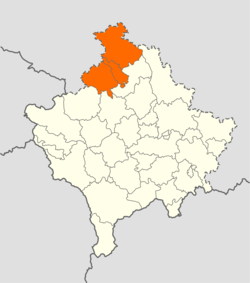
Back Төньяҡ Косово Bashkir Паўночнае Косава Byelorussian Северно Косово Bulgarian Kosovo del Nord Catalan Severní Kosovo Czech Nordkosovo German Βόρειο Κοσσυφοπέδιο Greek Kosovo del Norte Spanish Ipar Kosovo Basque Pohjois-Kosovo Finnish
North Kosovo
Ibar Kolašin | |
|---|---|
 North Kosovo is marked in orange | |
 | |
| Coordinates: 43°29′N 21°27′E / 43.483°N 21.450°E | |
| Country | |
| Largest city | North Mitrovica |
| Area | |
• Total | 1,007 km2 (389 sq mi) |
| Population | |
• Estimate (2015) | 79,910 |
| • Density | 48/km2 (120/sq mi) |
| ^ "North Kosovo" is not an official subdivision of the Republic of Kosovo. Ibarski Kolašin is a geographical region. | |
North Kosovo (Serbian: Северно Косово, romanized: Severno Kosovo, Albanian: Kosova Veriore); also known as the Ibar Kolašin[1] (Serbian: Ибарски Колашин, romanized: Ibarski Kolašin, Albanian: Koloshini i Ibrit or Kollashini i Ibrit); earlier Old Kolašin,[2] (Serbian: Стари Колашин, romanized: Stari Kolašin, Albanian: Koloshini i Vjetër or Kollashini i Vjetër), is a region in the northern part of Kosovo, generally understood as a group of four municipalities with ethnic Kosovo Serbs majority: North Mitrovica, Leposavić, Zvečan and Zubin Potok.[3]
Prior to the 2013 Brussels Agreement, the region functioned independently from the institutions in Kosovo, as they refused to acknowledge and recognize the independence of Kosovo, declared in 2008.[4][5] The Government of Kosovo opposed any kind of parallel government for Serbs in this region.[6] However, the parallel structures were all abolished by the Brussels Agreement, signed between the governments of Kosovo and Serbia. Both governments agreed upon creating a Community of Serb Municipalities. The association was expected to be officially formed in 2016. According to the agreement, its assembly will have no legislative authority and the judicial authorities will be integrated and operate within the Kosovo legal framework. Political wrangling over Kosovo's status between its government and Serbia has resulted in Kosovan authorities not allowing the formation of the Community. However differences remain and North Kosovo remains under de facto Serbian rule.[need quotation to verify]
- ^ Cvetković, Marina. "The exchange of gifts at traditional weddings in the Ibarski Kolašin" – via Google Books.
- ^ Ilić, Jovan (1995). The Serbian question in the Balkans. Faculty of Geography, University of Belgrade. ISBN 9788682657019 – via Google Books.
- ^ Živković, Miloš; Slobodan, Kremenjak; Stojković, Miloš (2020). Media Law in Serbia. Kluwer Law International. pp. 20–21. ISBN 9789403523033. Retrieved 11 October 2022.
- ^ BBC, Could Balkan break-up continue?, 22.02.08
- ^ ""Koha ditore": Kosovska vlada bez ingerencija na severu Kosova - Vesti dana - Vesti Krstarice". 13 July 2011. Archived from the original on 13 July 2011.
- ^ Kosovo PM: End to Parallel Structures, BalkanInsight.com, March 7, 2008